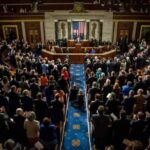Summary
⚈ Treasury Secretary reportedly expects China trade talks to last years.
⚈ Private warnings contradict public optimism from the Trump administration.
The first three months of Donald Trump’s second presidency have been tumultuous for, essentially, everyone.
Investors and businesses have been hit hard in particular, as the stock market has been trading with much volatility and a generally downward direction, leading many to speculate the U.S. is either headed toward a recession or is already in one.
The chaotic situation has led to what the Wall Street Journal described as a flurry of closed-door meetings, with the topics discussed and conclusions reached being disconcerting.
A prime example of this tone comes from a comment attributed to Jamie Dimon, the CEO of America’s largest bank, JPMorgan (NYSE: JPM).
Specifically, Dimon allegedly opined that a mild recession is the best the U.S. economy can hope for as a result of the ongoing trade war in one such talk hosted by JPMorgan itself in front of 500 investors in late April.
Notably, the billionaire CEO also mentioned that he would welcome a ‘mild recession’ in 2023 and has been discussing such a possibility since at least 2022.
Why a ‘mild recession’ might be the best-case scenario
While a ‘mild recession’ does not sound particularly comforting for the majority of investors and citizens, it is worth noting that other experts have issued significantly more dire warnings.
For example, Harry Dent, a financial expert, explained earlier in April that he expects a catastrophic crash in the coming months and years, which would see the equity markets plunge 50% by summer and approximately 80% before the uptrend is regained.
The notion that a ‘mild recession’ is the best possible outcome also appears reasonable given the comments attributed to Treasury Secretary Scott Bessent at the same event that saw Dimon’s dire warning.
Is behind-closed-door Washington contradicting public Washington?
The Trump administration has been very vocal about its supposedly active negotiations with China going well in recent weeks.
China is arguably not only one of the hardest-hit countries in the ongoing trade war but also the most important one for the American economy and the most vocal about its willingness to fight as long as necessary.
Under the circumstances, the fact that Beijing has been denying that talks are taking place has been almost as worrying as the reports that both countries are seeking to isolate the other in discussions with third parties.
Along the same lines, Bessent’s alleged comments behind closed doors about Washington expecting talks with the People’s Republic to take several years also serve to confirm the severity of the situation, while undermining the White House’s other public statements.
Featured image via Shutterstock









